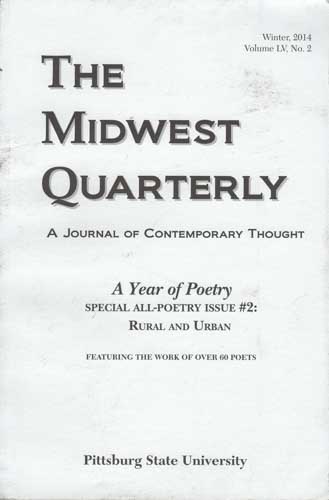The Midwest Quarterly – Winter 2014
This all-poetry issue of The Midwest Quarterly was a treat that did not disappoint. I grew up in a rural community, population south of 4000, and we were the county seat: these poems spoke straight to my childhood. As with all good poems, I’m sure there are pieces here that will speak to city folk as well, but the trip down memory lane was outstanding for me. The only gripe I have about the entire issue is that there was no table of contents for easy reference, so it took some effort to relocate my favorites for closer inspection.
This all-poetry issue of The Midwest Quarterly was a treat that did not disappoint. I grew up in a rural community, population south of 4000, and we were the county seat: these poems spoke straight to my childhood. As with all good poems, I’m sure there are pieces here that will speak to city folk as well, but the trip down memory lane was outstanding for me. The only gripe I have about the entire issue is that there was no table of contents for easy reference, so it took some effort to relocate my favorites for closer inspection. Publishers opted to put the contributor bios at the front of the issue instead of a TOC. Don’t worry, I’m a country boy, I accepted the work!
Rachel G. White did an outstanding job of highlighting some of the work that goes into being raised in the country in “Cutting Hogs.” Farmers get to play veterinarian with their animals every year. With my family it was cutting horns and testicles off calves; in the poem she remembers working hogs. My favorite lines were, “Their teeth sound like breaking ice / when dad clips them off, keeps them from / growing out tusks to gouge us or one another.” My personal connection due to my farming background made this my favorite poem in the issue.
Kate Robinson takes a look at who I cannot help but think of as a homeless individual in the poem “In the Red Barn.” It is the first poem in the issue and serves as a slap-in-the-face to remind readers that poetry is not always nice. It’s a tight poem with truly visceral descriptions. I especially enjoy the lines, “there is no heat or blankets in the barn / no light, no water no sound / there is only two lungs in a man with cold feet.” Readers definitely need to check out this poem to find out more about this scenario. It will stick with me for a while!
Near the front of this issue is a whole flock of bird poems by various authors. Included are pieces by Deborah Kroman, Audrey Henderson, Jonathan Greenhause, and others. There are imaged birds, flight metaphors, multiple species, and even talking birds. Noel Sloboda captures a wonderful conversation between man and his winged counterpart in “Another Remonstrance”:
Why so early with the singing?
Isn’t regurgitated food traumatic for babies?
He counters with queries of his own.
Who would surround a nest with walls?
“Prairie Madness,” by Lucia Galloway, is a sestina that absolutely transported me as a reader into the country. Not to give too much of the poem away, I have decided to share her six repeated words and then let you look up the poem to witness the wonderful way in which puts them together: aisles, stalks, bored, script, mad, and defense.
Poet Joseph Lennon strings together haikus to create a dialogue between citizens of a small town and with the reader. “Flatland Haiku Summer” makes for a three-page powerhouse of work. My favorite of the included haiku read, “Catfish for dinner— / you’re lucky it’s not burnt— / Charlene’s drinking beer.” So much about those syllables makes my mouth water.
The byline for The Midwest Quarterly states, “A Journal of Contemporary Thought.” At the end of working through the issue, I find myself very grateful that these country thoughts still exist in a contemporary world and that someone took the time to print them. Definitely worth a look!
[www.pittstate.edu/department/english/midwest-quarterly]





